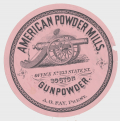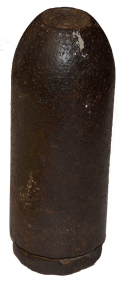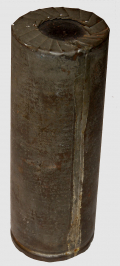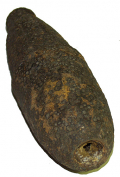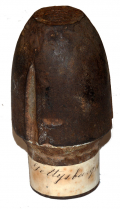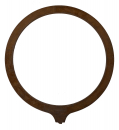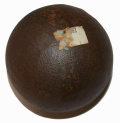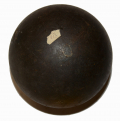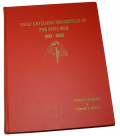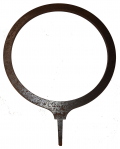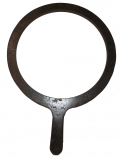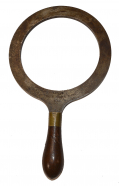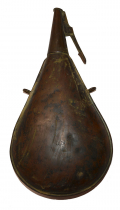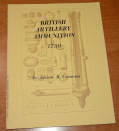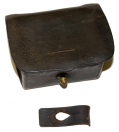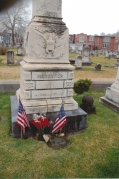site search
online catalog
Artillery
Showing 1 to 63 out of 63
RARE PACK OF CONFEDERATE, RICHMOND ARSENAL, ARTILLERY FRICTION PRIMERS
Offered here is a very rare, nice condition, original pack of artillery friction primers manufactured at the Richmond Arsenal in Virginia during the Civil War. These “primers” are what was placed… (1268-512). Learn More »
PACK OF FRANKFORD ARSENAL 15-SECOND FUSES
This pack of 15-second artillery fuses originates from the Frankford Arsenal and was produced in 1864. The pack is constructed of a drilled wood block covered with a printed paper label. This paper… (1202-459). Learn More »
VERY RARE CONFEDERATE ARTILLERY FUSE POUCH – MAKER MARKED
Very fine condition brown leather fuse pouch. Made by J. Darrow in Augusta, Georgia. The leather remains in remarkable condition with some signs of use and minor scuffing, but absolutely no crackling… (1268-509). Learn More »
$7,500.00
ON HOLD
PACK OF FRANKFORD ARSENAL 8-SECOND FUSES
This pack of 8-second artillery fuses originates from the Frankford Arsenal and was produced in 1863. The pack is constructed of a drilled wood block covered with a printed paper label. This paper… (1202-457). Learn More »
$75.00
ON HOLD
PACK OF FRANKFORD ARSENAL 5-SECOND FUSES
This pack of 5-second artillery fuses originates from the Frankford Arsenal and was produced in 1864. The pack is constructed of a drilled wood block covered with a printed paper label. This paper… (1202-456). Learn More »
CIVIL WAR ARTILLERY GUNNER’S CALIPERS
This is an excellent set of Civil War-era artillery gunner’s calipers. A scarce artilleryman’s implement, these are believed to have been issued at a rate of one for every six guns. Gunner… (1268-590). Learn More »
ARTILLERY PRIMING WIRE FOR FIELD GUNS
This is a tool for punching a hole in the powder bag through the cannon vent hole. Made of stout wire, it is 9.75” long overall with a 2” diameter loop handle at the top. The business end features… (1268-593). Learn More »
CIVIL WAR US ARTILLERY LANYARD
A standard implement with every artillery piece, this rare, Civil War-era artillery gunner’s lanyard has survived the years in good condition. The iron hook at the end of the hemp lanyard was… (1268-592). Learn More »
$395.00
ON HOLD
ARTILLERY VENT PUNCH FOR FIELD GUNS
This is a tool for clearing the vent of any obstructions such as pieces of fired friction primers. It has an octagonal head with a hole in the center, and a 4.25” wire brazed to it. The wire ends… (1268-595). Learn More »
$75.00
SOLD
ARTILLERY TOW HOOK STAMPED “US”
The tow hook was an essential tool in the artillery for replenishing ammunition. Measuring 14” overall, it carried a claw-hammer head on one end of an iron bar handle bent at the other end to form a… (1268-591). Learn More »
$395.00
SOLD
LEATHER ARTILLERY THUMBSTALL
Buff leather thumbstall used by artillerymen for plugging the vent of a hot cannon barrel when it is swabbed between shots. Blocking the vent prevented air from being sucked into the barrel and… (1268-597). Learn More »
$395.00
SOLD
U.S. PARROTT TIME FUSE ADAPTER
Parrott time fuse adapters were manufactured of zinc, have twelve threads to the inch, two spanner holes, and a larger central hole running through to insert the paper time fuse. This style adapter… (1268-602). Learn More »
RARE PACK OF CONFEDERATE, RICHMOND ARSENAL, ARTILLERY FRICTION PRIMERS
Offer here is a very rare, excellent condition, original pack of artillery friction primers manufactured at the Richmond Arsenal in Virginia during the Civil War. These “primers” are what was… (2025-198). Learn More »
$2,295.00
SOLD
RARE PACK OF CONFEDERATE, RICHMOND ARSENAL, THREE-SECOND ARTILLERY FUZES
Offer here is a very rare, excellent condition, original pack of three-second time fuzes manufactured at the Richmond Arsenal in Virginia during the Civil War. Pack is constructed of a drilled wood… (2025-179). Learn More »
$1,950.00
SOLD
CONFEDERATE 6LB SPHERICAL SHOT – TRIANGULAR FIELD/DEVIL’S DEN AREA
This dug Confederate 3.67” spherical shot was recovered long ago on private property near the area just below Devil’s Den - in the vicinity of the “Triangular Field”. Its condition is… (2025-196). Learn More »
$895.00
ON HOLD
US/CS 12-POUND SMOOTHBORE CANISTER PLATE WITH 7 CANISTER SHOT RECOVERED AT GETTYSBURG – ZIEGLER COLLECTION / GEISELMAN COLLECTION
This specimen of Civil War ammunition consists of the remnants of a 12-pounder smoothbore stand of canister gathered from the Gettysburg battlefield. Originally from the Ziegler Collection, this early… (2025-100). Learn More »
$695.00
ON HOLD
AMERICAN POWDER MILLS BOSTON CIRCULAR LABEL
Measures 6” in diameter. Nice woodcut of a cannon in center; printed on pink paper. Minor damage to each. [ss] [PH:L] ~~~~~~~~~~~~~~~~~~~~~~~~~~~~~~~~~~~ THIS ITEM, AS WITH ALL OTHER ITEMS AVAILABLE… (516-572). Learn More »
$35.00
Originally $44.00
RARE EXPERIMENTAL 10-POUNDER PARROTT SHELL
While the Parrott elongated shell was the standard ammunition for the 3-inch rifled cannons during the Civil War. This specimen is believed to be a very rare early or experimental variation. This… (490-7004). Learn More »
ORIGINAL CIVIL WAR NON-EXCAVATED 3-INCH HOTCHKISS CANISTER ROUND
Measuring 2.9” in diameter and 8” tall, and weighing 6 pounds 15 ounces, this is an original, non-excavated, complete, intact and nicely marked Civil War canister round for the 3-Inch Ordnance… (2025-37). Learn More »
BRITISH ARTILLERY SHIPPING CRATE
This is one of several scarce British artillery crates that recently came to hand, some of which were marked “Quebec.” This is clearly stenciled in black on one end: “11/59” / “W[broad… (2024-1156). Learn More »
BRITISH ARTILLERY SHIPPING CRATE
This is one of several scarce British artillery crates that recently came to hand, some of which were marked “Quebec.” Along with other ordnance and shipping markings, this is clearly stenciled at… (2024-1154). Learn More »
U.S. 3” SCHENKL PERCUSSION SHELL – EAST CAVALRY FIELD, GETTYSBURG - GEISELMAN COLLECTION
This Federal, intact 3” Schenkl percussion shell specimen is a wonderful artillery relic recovered from East Cavalry Field sometime after the Battle of Gettysburg. The percussion shell measures 9”… (2024-2389). Learn More »
U.S. 3” SCHENKL PERCUSSION SHELL FRAGMENT RECOVERED AT HUNTERSTOWN NEAR GETTYSBURG - GEISELMAN COLLECTION
Here is a large, very fine example of shell fragment from a fired, 3” Schenkl percussion projectile that was recovered from the battle of Hunterstown near Gettysburg. Once part of the Detrick… (1179-1293). Learn More »
ARTILLERY SPANNER WRENCH
This is a scarce original spanner wrench for artillery fuses. Constructed entirely of iron, this likely for fuses used in larger weight shells and those that used Navy fuses with water-cap covers, the… (2024-2328). Learn More »
$395.00
SOLD
ARTILLERY GIMLET FOR 12-INCH GUN – WATERVLIET ARSENAL
The "gimlet" has a screw on the end and was intended to be used to remove broken pieces of friction primers from the vent. It could also serve as a priming wire to poke a hole in the powder bag. This… (2024-2312). Learn More »
STONE MOLD HALF FOR LARGE GRAPE SHOT
This piece is an early mold half for a round grape shot ball. This piece measures approximately 3.5” x 2” x 2.5”. The cavity measures just shy of 2” in diameter. The funnel leading into the… (236-1026). Learn More »
T-HANDLE ARTILLERY GIMLET
The "gimlet" has a screw on the end and was intended to be used to remove broken pieces of friction primers from the vent. It could also serve as a priming wire to poke a hole in the powder bag. This… (2024-2313). Learn More »
PACK OF FRANKFORD ARSENAL 10-SECOND FUSES
This pack of 10-second artillery fuses originates from the Frankford Arsenal and was produced in 1863. The pack is constructed of a drilled wood block covered with a printed paper label. This paper… (2024-2337). Learn More »
$85.00
SOLD
PACK OF FRANKFORD ARSENAL 5-SECOND FUSES
This pack of 5-second artillery fuses originates from the Frankford Arsenal and was produced in 1864. The pack is constructed of a drilled wood block covered with a printed paper label. This paper… (2024-2339). Learn More »
ARTILLERY VENT PUNCH FOR 12-INCH MORTAR – WATERVLIET ARSENAL
This is a tool for clearing the vent of any obstructions. It has an octagonal head with a hole in the center, and a 21” wire brazed to it. The wire tappers at the end. The flat head is stamped,… (2024-2314). Learn More »
RELIC -- US NAVAL WATERCAP FUSE WITH BUSHING, DATED 1864
Excavated naval watercap fuse dated 1864 and in good condition. This fuse is made of brass with flange on top, with threaded portion and tapered body. A brass bushing is on this fuse to fit into… (2024-2327). Learn More »
3” HOTCHKISS SHELL WITH GETTYSBURG TAG – FROM YORK SPRINGS GAR POST
This shell is part of the collection that was housed at the York Springs GAR Post 551. Many of the items were collected and curated by David Starry, a Civil War veteran who served in an emergency… (1202-230). Learn More »
U.S. ARTILLERY FUSE POUCH MARKED “US”
Very nice condition leather fuse pouch. The leather of the outer flap is in very good condition. There is some crazing on the top “hinge” area of the flap. There is a deep “US” stamp on the… (864-14). Learn More »
1855 DATED 11-INCH SHOT/SHELL GAUGE
These simple iron ring gauges allowed for quick inspection and sorting of shot and shell by size, something of critical importance to a gun crew and a large task given the huge stacks of cannon balls… (490-6754). Learn More »
EXCAVATED U.S. 3” PARROTT SHELL FROM GETTYSBURG GAR POST #9
Here is a Gettysburg excavated Civil War Federal 3” field artillery projectile often referred to as a Parrott Type III shell excavated from an unknown location area on the Gettysburg battlefield… (2024-2135). Learn More »
BRITISH ARTILLERY CRATE FOR 9-POUND SOLID SHOT
The smooth-bore, muzzle-loading 9-pounder cannon was a standard British field-piece in service from 1805 to 1881, with a maximum range of about 1,400 yards and notable service in the Napoleonic Wars… (2024-1155). Learn More »
U.S. / C.S. 12-POUNDER SOLID SHOT – FROM G.A.R. “SKELLY” POST #9, GETTYSBURG
This is the most common solid shot projectile of any caliber used during the Civil War by both the Federal and Confederate forces. This is a solid iron cannon ball with dark brown tone and smooth… (490-6995). Learn More »
CONFEDERATE 3” MULLANE COMMON SHELL
Here is a fired Confederate 3” bourreleted Mullane Type 1 common shell recovered from an unknown battlefield location. Made for the 3” Ordnance Rifle. Also known as a “Tennessee Sabot”, this… (490-7005). Learn More »
U.S. / C.S. 12-POUNDER SOLID SHOT – FROM G.A.R. “SKELLY” POST #9, GETTYSBURG
This is the most common solid shot projectile of any caliber used during the Civil War by both the Federal and Confederate forces. This is a solid iron cannon ball with dark brown tone and smooth… (490-6993). Learn More »
RARE, EXCAVATED, CONFEDERATE 3” ARCHER BOLT WITH SABOT -- ANTIETAM
Here is an excavated, Confederate 3” field artillery projectile commonly referred to as an Archer Bolt. The design was likely produced by Dr. Robert Archer a partner of Joseph Anderson, the… (2024-1378). Learn More »
FIRED U.S. 3” HOTCHKISS CASE-SHOT
Offered here is a very nice excavated Union artillery shell that was fired and, partially, detonated. This is an iron, 3” Hotchkiss artillery shell that was intended to be fired from a 10-pounder… (490-7002). Learn More »
$895.00
SOLD
CIVIL WAR “SPINNER” QUILL PRIMERS FOR NAVAL CANNONS
These Naval cannon primers are constructed using fowl quills; less likely to corrode around salt water. These are percussion, not friction primers. In use, these were ignited by the blow from a… (2024-1521). Learn More »
BOOK – FIELD ARTILLERY PROJECTILES OF THE CIVIL WAR 1861-1865 BY KERKSIS & DICKEY
First edition, hardcover signed by both authors. Limited to 500 numbered copies, this is #303. Text clean and unmarked; 307 pages, 8.5” x 11”. The binding is tight and square. Cover is bright and… (2024-1206). Learn More »
RELIC -- US NAVAL WATERCAP FUSE DATED 1862
Excavated naval watercap fuse dated 1862 and in very good condition. This brass fuse is made of brass with flange on top, with threaded portion and tapered body. This type of fuse was utilized by the… (84-84). Learn More »
1857 US NAVY YARD WASHINGTON MARKED 10-INCH SHOT/SHELL GAUGE
This is a nice pre-Civil War US Navy shot or shell gauge dated 1857. The wood handle is missing, but iron tang and ring are intact, showing dark, with some light pitting, but good markings on the base… (490-6808). Learn More »
11-INCH SHOT/SHELL GAUGE
These simple iron ring gauges allowed for quick inspection and sorting of shot and shell by size, something of critical importance to a gun crew and a large task given the huge stacks of cannon balls… (490-6807). Learn More »
POSTWAR US NAVY YARD WASHINGTON ARTILLERY SHOTSHELL GAUGE
This shell gauge still has its wood handle with brass ferrule and is clearly marked on the base of the ring: “ORD. DEPT. U.S. N.Y.W. / 1867 / G.B. / [anchor]” on one side, and “STANDARD / SMALL… (490-6806). Learn More »
RARE USN GOSPORT NAVY YARD PRIMING FLASK
Gosport Shipyard was the original name of the facility in Portsmouth, Virginia, that was founded in 1767, passed into the hands of Virginia in the Revolution, was leased from that state by the U.S.… (490-6824). Learn More »
NICE U.S. ARTILLERY FUSE POUCH
The leather is in nice, smooth condition with a pleasing dark brown tone. The latch tab is stitched to the underside of the flap. This tab remains unbroken but well worn. The outer flap is only… (490-6254). Learn More »
THEFT REPORTED AT AUTUMN GETTYSBURG SHOW
A vendor at the Autumn Gettysburg Civil War show held at the Allstar Events Complex on Oct. 28-29 reported that a Maryland sword belt plate valued at $3500 was stolen from a display case on Sunday…. Learn More »
BOOKLET ON 18TH CENTURY BRITISH ARTILLERY AMMUNITION FROM THE LIBRARY OF THE LATE DEAN S. THOMAS
The title of this pamphlet is “BRITISH ARTILLERY AMMUNITION 1780” by Adrian B. Caruana and published by Museum Restoration Service of Bloomfield, Ontario, Canada in 1979. Yellow heavy stock paper… (236-416). Learn More »
U.S. NAVY FRICTION PRIMER BOX
Small leather box to hold friction primers were carried on the belt (past terminology designated this type box as a Navy fuse box). The box is relatively square in shape to accommodate the shape of… (490-5342). Learn More »
CONFEDERATE ARTILLERY FUSE POUCH WITH LEAD FINIAL
Brown leather Confederate artillery fuse pouch is in good condition. This is the leather pouch that went on the side of the Confederate artilleryman. It held his paper time fuses for firing the… (381-20). Learn More »
$3,150.00
Originally $3,950.00
CIVIL WAR QUILL PRIMERS FOR NAVAL CANNONS
These Naval cannon primers are constructed using fowl quills; less likely to corrode around salt water. These are percussion, not friction primers. In use, these were ignited by the blow from a… (490-2928). Learn More »
CONFEDERATE TEN SECOND PAPER TIME FUSE
This ten-second fuse originated from the magazine at Fort Jackson, Louisiana. Fuse was recovered by a Union soldier in 1862, who packaged several in a box and documented it by writing the information… (R21944). Learn More »
$200.00
Originally $295.00
CONFEDERATE TEN SECOND PAPER TIME FUSE
This ten-second fuse originated from the magazine at Fort Jackson, Louisiana. Fuse was recovered by a Union soldier in 1862, who packaged several in a box and documented it by writing the information… (R21942). Learn More »
$200.00
Originally $295.00
COPPER SABOT FROM 3” MULLANE SHELL FROM GETTYSBURG
Found in Gettysburg after the battle. From the Soldier’s National Museum auction of 2014. Copper sabot stripped from a Confederate 3” Mullane artillery shell. The sabot is a round disk with a… (224-514). Learn More »
MEXICAN WAR TO CIVIL WAR PORTFIRE STOCK
Before the introduction of the friction primer it was necessary to keep a ready flame handy for the lighting of linstocks carrying slow match to fire the gun or to fire it directly and even later they… (1158-07). Learn More »
RARE 10” MORTAR SHELL (FRENCH & INDIAN OR REVOLUTIONARY WAR) FROM FORT TICONDEROGA MUSEUM COLLECTION
This early mortar shell was once housed in the Fort Ticonderoga Museum collection. It is an excavated 10” mortar shell in relic condition. The iron body of the shell is in solid condition with… (1117-26). Learn More »
COMPLETE PACKAGE OF TAYLOR FUSE IGNITERS
Here is a paper-wrapped stack of tin fuse igniters for Taylor’s time fuse. The whole stack is wrapped in tan packing paper. The packing paper is water damaged, missing a few fragments, and quite… (727-50). Learn More »
THEFT FROM GRAVESITE OF GEN. JOHN REYNOLDS
A large artillery shell, one of pair that sit on either side of the grave of Gen. John F. Reynolds in Lancaster Cemetery, Lancaster, PA has been removed from the site. If anyone comes into contact…. Learn More »
US ARTILLERY WHIP
This is a very rare find that came out of an artillery collection. Artillery whip has a turned wood handle with a brass cap at the end where the rawhide ties through to attach braided leather whip.… (33-160). Learn More »
CONFEDERATE 32 LB CANISTER BALL FROM ATLANTA
Offered is a Confederate canister ball from Atlanta Georgia. Each weighs approximately 1 lb. 4 oz. and are 2.10” in diameter. All show signs of moderate to heavy rust. These were uncovered during… (R3556). Learn More »
Showing 1 to 63 out of 63
Most Popular
Historical Firearms Stolen From The National Civil War Museum In Harrisburg, Pa »
Theft From Gravesite Of Gen. John Reynolds »
Selection Of Unframed Prints By Don Troiani »
Fine Condition Brass Infantry Bugle Insignia »
British Imported, Confederate Used Bayonet »
Scarce New Model 1865 Sharps Still In Percussion Near Factory New »
featured item
SCARCE 1859 DATED AMES LIGHT CAVALRY SABER, AKA MODEL 1860
Old habits die hard. Although we now know production of the new pattern cavalry saber intended to replace the heavy Model 1840 started in 1857, most still refer to them as the Model 1860. This is a scarce example of one produced by Ames in 1859 and… (2022-718). Learn More »
site search
Upcoming Events
APRIL 12-13: SPRING GETTYSBURG MILITARY ANTIQUES SHOW; All Star Events Complex Learn More »



















